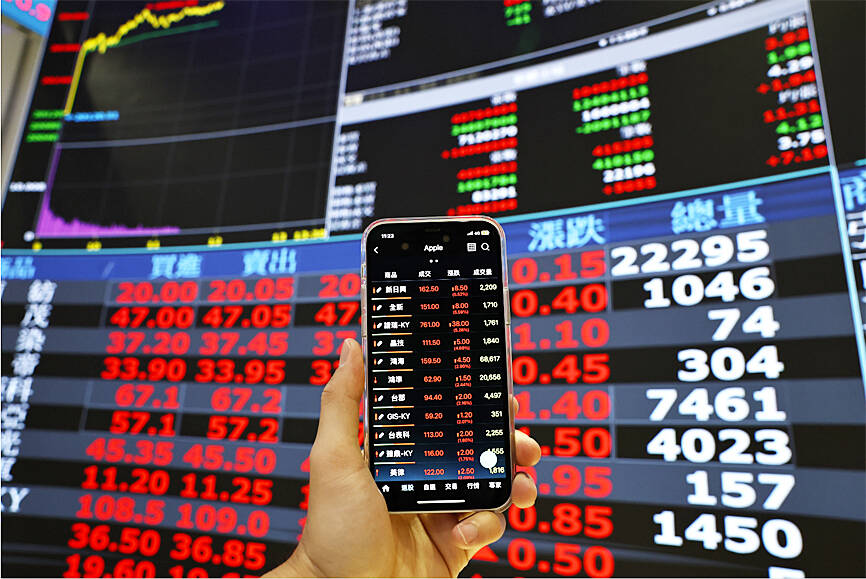The consumer confidence index this month declined by 10.14 points to a five-year low of 63.37, dragged mainly by drastic corrections on the local bourse, a report released yesterday by National Central University showed.
It was the steepest fall in history and reversed six straight months of upturn, said Dachrahn Wu (吳大任), director of the university’s Research Center for Taiwan Economic Development, which conducted the monthly survey.
The April 3 earthquake, which measured magnitude 7.2 on the Richter scale, and ensuing aftershocks are also to blame, even though the six subindices lost points, Wu added.

Photo: CNA
Confidence values of 100 and higher suggest optimism and points lower than the neutral threshold indicate pessimism.
The reading on stock investment was 24.65, falling an unprecedented 38.76 points from one month earlier, as the TAIEX tumbled more than 1,000 points during the survey period between April 18 and April 21, Wu said.
The TAIEX dropped 3.81 percent on April 19, one day after chipmaker Taiwan Semiconductor Manufacturing Co (TSMC, 台積電) painted a lukewarm picture for global chip demand for the rest of this year.
Foreign institutional players slashed holdings of local shares by NT$704.79 billion net, which saw the local currency fall to an eight-year low.
There is no need to assign excessive importance to the investment confidence measure, which is volatile and susceptible to political and economic shocks at home and abroad, Wu said.
The TAIEX yesterday reclaimed recent highs, thanks to a spillover effect linked to robust earnings by US technology giants.
The job market subindex fell 5.69 points to 64.72, while the gauge on future household income levels softened 4.85 points to 74.65, the survey showed.
Safety concerns and the many aftershocks would dampen interest in domestic tourism, especially in mountainous areas, which would take a toll on job opportunities in hospitality sectors, Wu said.
Several lodging facilities in Hualien County have temporarily suspended operations, with a few exiting the market for good.
Wu said he is personally skeptical that private consumption would be strong this year after two straight years of rapid expansion.
Public confidence in the nation’s economy for the next six months dropped 4.08 points to 79.6, as geopolitical tensions heighten and the US Federal Reserve could reconsider interest rate cuts amid stubborn inflation, the report said.
Meanwhile, the subindex on consumption of durable goods declined 4.04 points to 107.8, staying in healthy territory, the report showed.
The April 3 earthquake would have significant influence on house prices, as prices of apartments built with better temblor resistance would increase, Wu said.
People also remain discontent about retail prices, with the gauge seeing a reduction of 3.47 points to 28.78.

When an apartment comes up for rent in Germany’s big cities, hundreds of prospective tenants often queue down the street to view it, but the acute shortage of affordable housing is getting scant attention ahead of today’s snap general election. “Housing is one of the main problems for people, but nobody talks about it, nobody takes it seriously,” said Andreas Ibel, president of Build Europe, an association representing housing developers. Migration and the sluggish economy top the list of voters’ concerns, but analysts say housing policy fails to break through as returns on investment take time to register, making the

‘SILVER LINING’: Although the news caused TSMC to fall on the local market, an analyst said that as tariffs are not set to go into effect until April, there is still time for negotiations US President Donald Trump on Tuesday said that he would likely impose tariffs on semiconductor, automobile and pharmaceutical imports of about 25 percent, with an announcement coming as soon as April 2 in a move that would represent a dramatic widening of the US leader’s trade war. “I probably will tell you that on April 2, but it’ll be in the neighborhood of 25 percent,” Trump told reporters at his Mar-a-Lago club when asked about his plan for auto tariffs. Asked about similar levies on pharmaceutical drugs and semiconductors, the president said that “it’ll be 25 percent and higher, and it’ll

NOT TO WORRY: Some people are concerned funds might continue moving out of the country, but the central bank said financial account outflows are not unusual in Taiwan Taiwan’s outbound investments hit a new high last year due to investments made by contract chipmaker Taiwan Semiconductor Manufacturing Co (TSMC, 台積電) and other major manufacturers to boost global expansion, the central bank said on Thursday. The net increase in outbound investments last year reached a record US$21.05 billion, while the net increase in outbound investments by Taiwanese residents reached a record US$31.98 billion, central bank data showed. Chen Fei-wen (陳斐紋), deputy director of the central bank’s Department of Economic Research, said the increase was largely due to TSMC’s efforts to expand production in the US and Japan. Investments by Vanguard International

WARNING SHOT: The US president has threatened to impose 25 percent tariffs on all imported vehicles, and similar or higher duties on pharmaceuticals and semiconductors US President Donald Trump on Wednesday suggested that a trade deal with China was “possible” — a key target in the US leader’s tariffs policy. The US in 2020 had already agreed to “a great trade deal with China” and a new deal was “possible,” Trump said. Trump said he expected Chinese President Xi Jinping (習近平) to visit the US, without giving a timeline for his trip. Trump also said that he was talking to China about TikTok, as the US seeks to broker a sale of the popular app owned by Chinese firm ByteDance Ltd (字節跳動). Trump last week said that he had